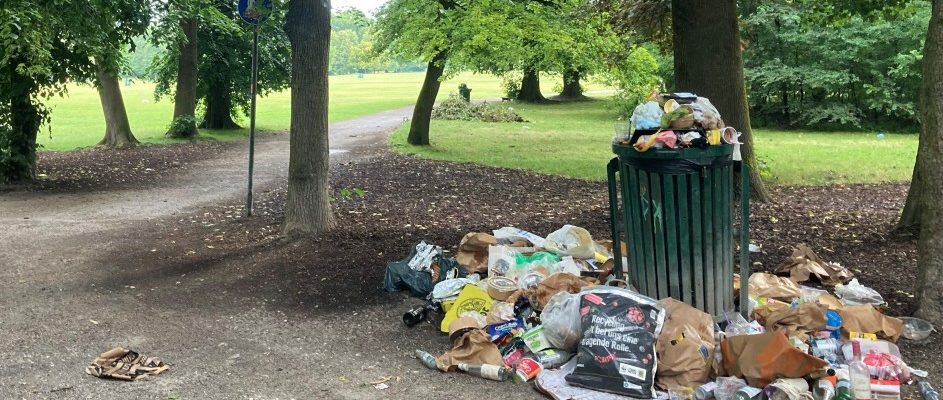In the morning, when it is still pleasantly cool on these hot summer days, the English Garden exudes a very special charm. The sun is peeping through the trees, the water in the streams is glistening and even the lawn looks different at this time of year. Without all the rubbish that accumulates over the course of the day, especially in the 130-hectare southern part of the park. Because hard-working helpers there, between the Haus der Kunst and the Kleinhesseloher See, have already removed it at an early hour.
The amount of waste in Munich’s green lungs has become a real problem in recent years. “Groups partying in particular often leave their rubbish behind after dark,” says Ines Holzmüller from the Bavarian Palaces and Lakes Administration. Beer and wine bottles, snack bags, plus lots of to-go packaging, sometimes with and sometimes without leftovers. The cleaning team also found broken inflatable boats, pieces of furniture or household rubbish early in the morning. Most of the rubbish lies on the meadows below the Monopteros and near the Eisbachwelle. The increase, says the spokeswoman, is so “enormous” that the palace administration is now appealing to park guests to take more consideration of this “unique work of garden art”.
A look at the statistics shows what quantities Holzmüller is assuming. In 1997 there were still 65 tons of leftovers to dispose of, in 2019 there were already 163 tons. A year later the number rose to 200 tons. In 2021, even 260 tons of garbage came together. In the meantime, this mass has decreased slightly again, to 225 tons last year. But she’s still overwhelming. When the weather is nice, around half a ton of waste accumulates every day – that corresponds to a volume of around three cubic meters. As much as fits into a small rubble container.
Only a fraction of this amount comes from the rubbish bins, of which there are 120 in the southern part of this landscape protection area alone – supplemented by ten “trash boxes” with a capacity of one cubic meter each. There are another 34 rubbish bins in the courtyard garden. And more than 200 in the northern part of the park, the 245 hectare “Hirschau”. They are all emptied daily. The castles and lakes administration, explains Holzmüller, have “already set up garbage cans with a larger capacity” in order to get the situation under control. But the whole thing only works if the containers are actually used.
But the meadows are still littered with pizza boxes, disposable cups and bottles – the only thing that helps is the garden team’s tongs. Up until a few months ago, a team from the palace administration did this cleaning job themselves, but since this spring a private company has been taking care of the garbage disposal in the English Garden on behalf of the palace administration. Occasionally supported on a voluntary basis by companies and clubs, who roam through the park in the form of team-building activities, also equipped with tongs and sacks.
After all, there have been no protests from residents, such as those that have popped up massively in recent years as a result of the party mood of park visitors at the Altstadt-Lehel district committee. “There hasn’t been a single complaint this year,” says Andrea Stadler-Bachmaier (Greens), head of the committee. Neither because of garbage nor because of noise. Corona-related restrictions, she explains, no longer existed, bars and restaurants would have reopened. This reduces the rush to the English Garden somewhat.
But even if there is no acute need for action – the potential for conflict remains. “We will not solve the problem, public space belongs to everyone,” says the local politician. “We can only try to create understanding.” Banners asking for consideration for neighbors, such as those hung around the celebration hotspot Gerner Brücke on the Nymphenburg Palace Canal last year, cannot be implemented in the English Garden for legal reasons. But posters on MVV bus shelters could possibly raise awareness of fair coexistence. A corresponding request is already in progress. The district politicians are also in talks with the Wilhelmsgymnasium: The idea is to equip Prinzregentenstrasse and Paradiesstrasse with pictograms or writing as part of an art project. Details still need to be clarified.
City council factions want to establish “waste watchers”.
The citizens’ representatives also want to get a grip on the toilet issue, which has been smoldering for a long time. Because there are too few public toilets in the English Garden. The latest idea is to build a public toilet next to the school sports facility at Hirschanger. “But that’s not yet ready for a decision,” says Stadler-Bachmaier. The ball is now in the hands of the Education and Building Department.
The problem in the English Garden shows what is happening in the rest of the city like a magnifying glass. The so-called “littering” – disposable packaging, plastic bottles or cigarette butts that are carelessly thrown on the ground or in the bushes – is now also a thorn in the side of the city council. The factions of the Greens/Pink List, CSU/FW, SPD/Volt, ÖDP/München Liste and Linke/Die Party are therefore unanimously calling for the use of “waste watchers”. The task of this patrol should be to talk to the people, give them garbage bags and ashtrays and thus contribute to preventive education and waste avoidance. In the case of particularly recalcitrant environmental offenders, imposing fines is also an option. The Wastewatcher concept has been used successfully in Hamburg for years.

